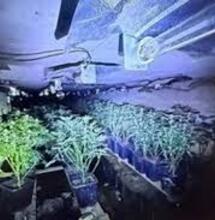How Easy is it to get Weed in Prison?

Despite the government spending a whopping £15m on X-ray scanners for jails in England and Wales, almost a third of prisoners still claim that it's still easy to get hold of illegal substances behind bars.
There are some pretty weird ways drugs have found their way into prisons, including drones, powder mixed with paint on a child's picture, babies' nappies, and so on. However, prison officers report that drugs get inside prison mainly via visitors.
Research suggests that the number of prisoners who develop a drug problem whilst doing time has more than doubled in recent years.
The analysis of survey data from the HM Inspectorate of Prisons by the think tank Reform found that the number of offenders who reported developing a drug problem rose 8.4 per cent to almost 15% between 2013-2014 and 2018-2019.
The study found that prisons were not well equipped to disrupt the drug supply, especially since security standards vary significantly from prison to prison.
The former prisons minister, Rory Stewart, said the prison system had been unprepared for new psychoactive drugs like "Spice".
Spice is the most broadly used psychoactive substance. It comes in a liquid form and can easily be sprayed on paper, which is then quickly ripped up, added to roll-up cigarettes and smoked. Unfortunately, this makes it all too easy to smuggle into prison.
Research by Reform found that prisons were often in poor condition, overcrowded and floundering to keep hold of experienced staff. The report reasoned that short-term prison sentences were counterintuitive and contributed to overcrowding problems.
Official figures showed that community sentences for minor offences had dropped by 52% since 2010. This is despite evidence that they are more effective and a fraction of the cost of annual prison costs. The think tank recommended the Ministry of Justice consider banning or reducing short custodial sentences.
Aidan Shilson-Thomas, a Reform researcher and the report's author, commented that there must always be a spot in prison for those guilty of serious crimes. However, prison must also be a place where inmates change their behaviour.
"Stabilising the system means stemming the flow of drugs, reducing overcrowding, fixing the crumbling estate and improving officer retention. Its long-term sustainability requires a serious conversation about how many people we lock up and for how long. Failing to act will mean poorer social outcomes, more reoffending and ultimately huge costs to the taxpayer."
A Ministry of Justice's position is that "Illicit substances pose considerable challenges to the prison system. That is why they have invested £100m in airport-style security x-ray body scanners. Something which is part of a larger £2.75bn investment to make jails safer for offenders and staff. The Ministry of Justice also works closely with healthcare providers to give prisoners the support they need to be drug-free upon release."







